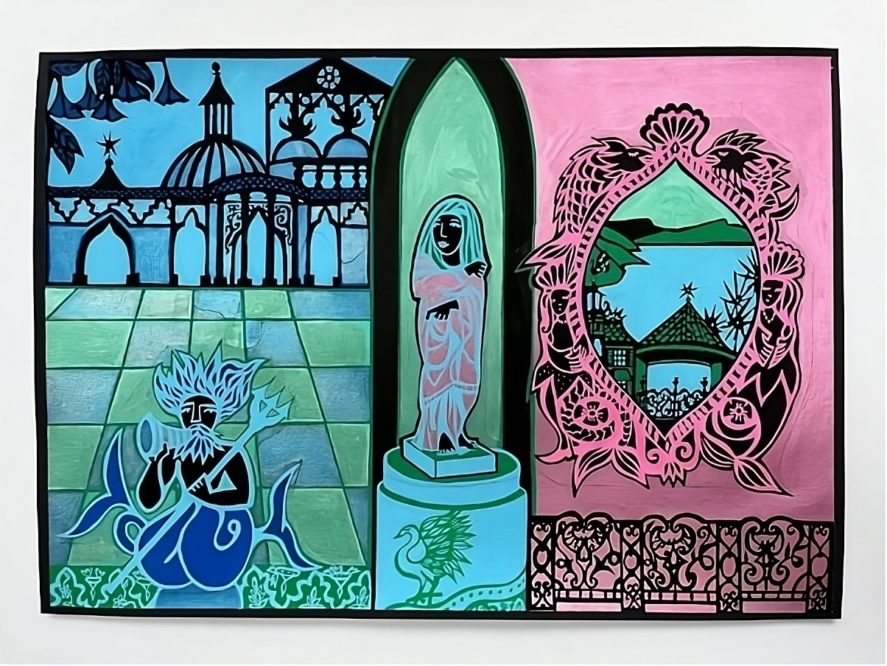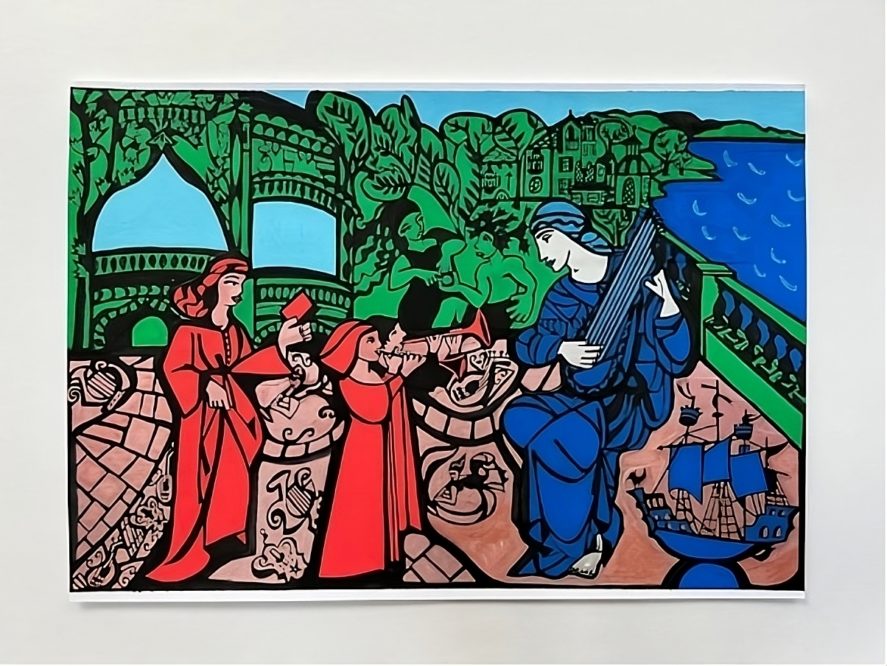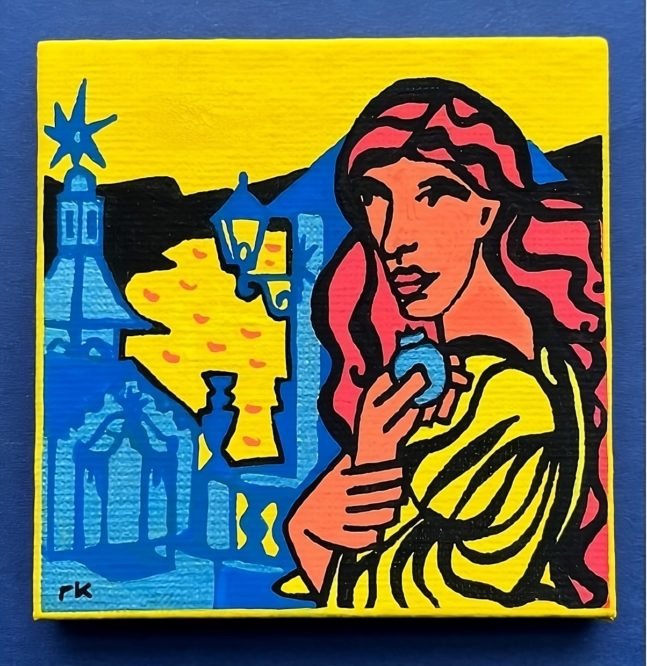A Colourful Place in Which to Dream, an exhibition by Ruth Koffer

Julie Brominicks
Such bold colours! Clean lines. Pleasing asymmetry. These motifs, that use of pattern, such beguiling narrative; all so very Ruth Koffer. Trademark Clough Williams-Ellis too, the architect of Portmeirion, which you will recognise in these exquisite pieces, if you have visited that Italianate seaside village of campaniles and cobbles.
Take a look at ‘My New Friend’. Do you recognise Portmeirion’s domes and tiles, the estuary, and Neptune? That’s Clough’s talent. Now see how the statues come alive. That’s Ruth’s genius. What is going on here? Does the female statue enjoy Neptune blowing his shell? Is she about to step off her pedestal?
Statues
A few days after seeing this exhibition, the statues are just one thing I’m keen to quiz Ruth about, as we chat over carrot cake and coffee in her Aberystwyth flat. ‘I was there after hours earlier this year with nobody about’ she says. ‘It was just me hanging out with the statues, especially Hercules.
I was imagining them maybe going for a drink or out for a sail.’ She points to a tinier picture called ‘To the Future.’ ‘These two statues hit it off. It’s about dating and curiosity basically.’
‘A Colourful Place in Which to Dream’, Ruth’s homage to Portmeirion is currently at Plas Brondanw, the home which Clough Williams-Ellis inherited and in which he lived, overlooking Yr Wyddfa.
Plas Brondanw is open to the public and hosts visiting exhibitions to which works from the permanent collection by Clough’s daughter – artist and ceramist Susan Williams-Ellis – are added. So among Ruth’s work are complementary pieces by Susan. Here a pink bowl. Here a tiny jug on which is a galleon.

Mermaids
As in Portmeirion, the galleon, mermaids and the sea are recurring motifs. ‘Portmeirion is like a playground for adults’ Ruth tells me. ‘You can dream, you can just be silly. The influence the architecture had on me was phenomenal. It allowed me to be playful.
There’s nothing masculine and functional about his architecture. It’s all conversational and community-minded, sensitive and gentle.’
‘There’s something I want to say’ she adds, pouring more coffee, ‘before you ask any more questions. It’s about women our age.’ (She’s 47, I’m 52.) ‘If a woman hasn’t prioritised being creative, if I’d waited to become an artist’ she frowns. ‘I’d be feeling a hell of a lot worse about this time of life. And actually I feel great.
Creative people have already learned how to process discomfort and rejection. And as a result, something celebratory is coming out in my work about the feminine. It’s very binary. My women have long eyelashes. But it’s deliberate.
I’ve read the current dialogue on feminism and internalised misogyny and if I want to dye my hair or wear heels for example; if I denied myself that for fear of being judged as frivolous or flirty – well then I’d be doing the patriarch’s dirty work for them. So my characters are coming out as super feminine at the moment. It’s very important to me.’

There is delicious mystery in Ruth’s art. A magical realism. The characters play musical instruments, dance, write and kiss, their expressions enigmatic as if they inhabit a world of dreams. Ruth describes herself as a visual storyteller, and I’m keen to know if she knows what the stories are.
‘No’ she says, ‘I don’t. I give my works titles with room for the audience to find their way in. But it is always a love story. I’m a complete romance junkie. In Portmeirion there’s all these cute little love stories all around.’
The enigmatic expressions are deliberate too. For decades I’ve admired Ruth’s draftsmanship as it evolved from exploratory outlines of branches, through figures animated into movement by multiple outlines, till now her execution has become so confident and expert the line is pure. ‘I really go to town with crisping it up. I don’t leave any ambiguity any more. And the arty girl inside me doesn’t like mess’ says Ruth. ‘She will tidy it up.
OCD
She’s OCD basically and she doesn’t like mixing. She likes pure colour contained by a line. I’ve trained myself of late to not describe the character – not to focus on the details but to focus on the posture. Then it’s the posture which reveals the character. That’s why the faces are enigmatic.’
These bijou artworks (perhaps smaller than you’d expect after seeing them onscreen) inspire attentive curiosity. You scrutinise them for detail, but the compositions also contribute to the narrative. Your eye travels over them, sometimes from side to side as if reading a book, sometimes around the periphery.
Like Clough, Ruth is brave enough to put things off-centre (like the vignette in ‘Anticipating the Magic’) or even leave a space in the middle like ‘On Visiting the Magic Garden.’ How has this process come about?
Ruth works as a carer and much of her initial work is done on tea-breaks in tiny notebooks. On her one art-day a week, she cuts the sketches out and transfers them onto a bigger piece of paper. Collage is a compositional tool. Pattern too. ‘It could be Victorian, Indian, any kind of pattern.
When I use it to fill a space it brings a sense of celebration.’ While she’s arranging the composition she plays music. ‘1920s, 30s and 40s. Proper kind of crooners. Music is purposely coming into the story. It is trying to affect the composition with the memory of Portmeirion.’

This art is modest in size but big in joy and ambition. And as I walk around the gardens at Plas Brondanw that Clough Williams-Ellis also designed, I see parallels between his and Ruth’s work everywhere. Statues. Simple planes framed by leafy patterns, interrupted by a rose enlarged by proximity. This meeting between late architect and living artist is harmonious and truly, fabulously exuberant.
A Colourful Place in Which to Dream can be seen at Plas Brondanw till February 15th 2025. https://www.plasbrondanw.org/Exhibitions
To find out more about Ruth’s art, see https://ruthkoffer.com/
Support our Nation today
For the price of a cup of coffee a month you can help us create an independent, not-for-profit, national news service for the people of Wales, by the people of Wales.





